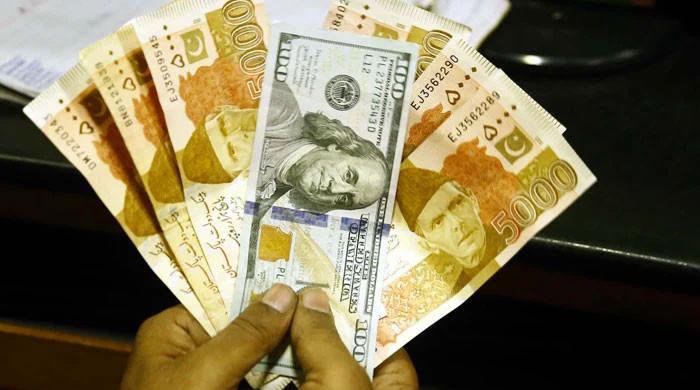Rupee likely to face pressure next week but won’t cross 280 per dollar


- Rupee closes week at 278.51 against dollar on Friday.
- Expected to face pressure due to substantial payments.
- Deterioration in CAD, expected rate cuts to affect rupee.
KARACHI: As the current fiscal year is about to come to an end, the dollar demand from importers is expected to pressurise the rupee next week, however, it is unlikely to cross the 280 per dollar level, The News reported on Sunday.
According to a report by financial terminal Tresmark released on Saturday, the local currency fluctuated within small bands in the interbank market during a holiday-shortened trading week.
The market opened on Thursday this week after Eid ul Adha and the rupee closed at 278.51 against the greenback on Friday by making little gains.
Even though the week was cut short, three important things happened. The KSE-100 briefly crossed the 80,000 level on Friday. In May, the real effective exchange rate was 100.7, compared with 104.4 in the previous month.
Furthermore, following three months of surpluses, Pakistan posted a $270 million current account gap. Record remittances were received, but the current account balance turned negative. Analysts predict that in June, the current account deficit will be significantly higher.
“While the rupee remained range bound, we see it coming under pressure next week due to substantial payments related to June ending,” said Tresmark, adding that “the deterioration in CAD [current account deficit], the slowdown in reserves, and expectations for further rate cuts will all be adverse for the rupee”.
Since other Asian currencies are under pressure, the report predicts that the rupee will likewise be affected. On Thursday, the Indian rupee hit a record low of 83.62 versus the greenback. “We expect rupee weakness, but it is unlikely that the rupee will breach the 280/$ level,” said the report.
“Traders expect the central bank to continue acting against any sharp moves in the rupee and the rupee may get some further support from SCRA [special convertible rupee account] inflows in both T-Bills and Equities, provided there is no political fallout.”
The report stated that the dollar-rupee forward premiums increased slightly, with the one-month implied yield rising 260 basis points (144 bps on the three-month swaps) after the US bond yields declined in response to economic data that increased expectations that the Fed will cut rates twice this year.
It does seem like the market is underestimating the political skirmishes around budget approval. These skirmishes have significant potential to disrupt the economy, according to the report.
To start with, the budget was bad across the board and so lacked support from any quarter. There is also conflicting news of changes being made behind the scenes, to which many of us are not privy.
“Last, if the budget is approved in a shape and form materially different from the original, you could as well count the International Monetary Fund out. Some of the darkest moments of Pakistan’s economy are when we are on the negotiating table with the IMF,” the report said.
Source link